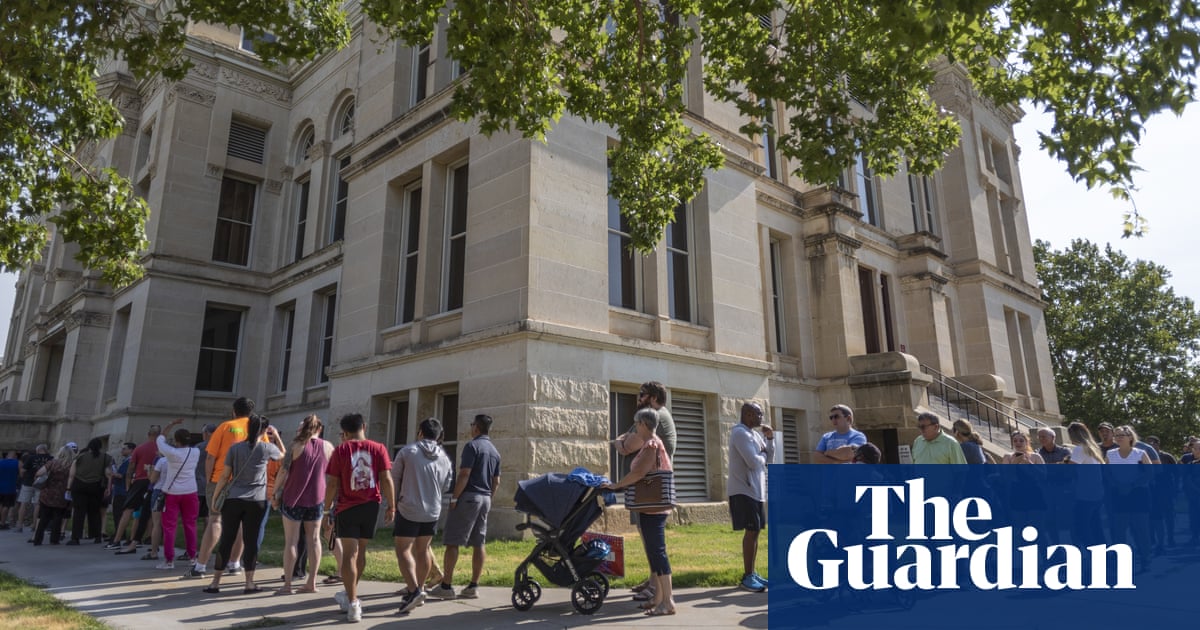In a bizarre mixed ruling combining several challenges to a 2021 election law, Kansas’s supreme court has ruled that its residents have no right to vote enshrined in the state’s constitution.
The opinion centering on a ballot signature-verification measure elicited fiery dissent from three of the court’s seven justices. But the majority held that the court failed to identify a “fundamental right to vote” within the state.
The measure in question requires election officials to match the signatures on advance mail ballots to a person’s voter registration record. The state supreme court reversed a lower court’s dismissal of a lawsuit that challenged that. The majority of justices on the state supreme court then rejected arguments from voting rights groups that the measure violates state constitutional voting rights.
…
Justice Eric Rosen, one of the three who dissented, wrote: “It staggers my imagination to conclude Kansas citizens have no fundamental right to vote under their state constitution.
“I cannot and will not condone this betrayal of our constitutional duty to safeguard the foundational rights of Kansans.”



Regardless of how the state constitution does their wordsmithing, don’t the 15th, 19th, 24th, and 26th amendments of the federal constitution, in combination, essentially grant all Kansans over 18 the right to vote (aside from restricted groups)? I could possibly see the state blocking certain people from state and local elections, or anything within their jurisdiction, but wouldn’t the state have zero say about federal elections?
I was just focusing on what was there in the Kansas Constitution; but, lets walk through it:
We’ll ignore Section 2, as it doesn’t seem useful here (same for other amendments below). So, you have a right to vote that cannot be limited by “race, color or previous condition of servitude”. That last bit meaning slavery. So, it kinda does seem to imply a universal right to vote. But again, this leaves open the possibility that the US Government (USG) and States do have the power to limit it otherwise. As a ridiculous example, it seems that this Amendment leaves open the possibility that the State could limit the right to vote for left handed people.
Pretty much exactly as above, but extending the protections to “sex”.
Continuing to extend the limits on USG/State powers. This time, it outlaws poll taxes.
And now we’ve extended the prohibition on limiting voting due to age.
There is a through-line on all of these which amounts to “The USG/State cannot limit the right to vote in these specific cases”. At the same time, they all leave open the possibility that the right to vote can be limited by the USG/States, so long as the reason isn’t one of the protected classes. The text of the US Constitution itself is pretty silent on the issue.
That kinda tosses the whole thing to the States to figure out. Though, that has been modified by Federal Law a few times.
This is the “Privileges and Immunities” clause of the US Constitution, and it’s been a useful “catch all” to further push the rights of the people. If a universal right to vote exists in the US Constitution, it’s probably here. But, that’s going to fall to judicial review. Which, for the moment, the Kansas court seems to have rejected.
Given all those references to the right to vote, does that not obviously show that there is a right to vote? And that the right shall not be denied for those reasons? Sort of an “exception proves the rule” sort of thing.
It does seem that there is an implicit right to vote, but not an explicit one. Which is why I mentioned the Privileges and Immunities clause, if there is a Constitutional right to vote, it likely derives from there. But, being implicit, rather than explicit, means that it falls to judicial review to codify it. It’s also not as solidly guaranteed. Unlike say, the right to assemble, there is no specific text you can point to and say, “this bit of text, right here, says it.” So, it wouldn’t be surprising to see any such decision overturned later on (see: Dobbs decision).
Gotcha, thank you for your detailed response. So what I’m gathering here is that, essentially, the universal right to vote has typically been pushed under the Privileges and Immunities clause, but only because there isn’t exactly any specific line or section in the Constitution that explicitly guarantees it, and also that the P&I clause was utilized via the benevolence (for lack of a better word) for the people by lawmakers and the judiciary?